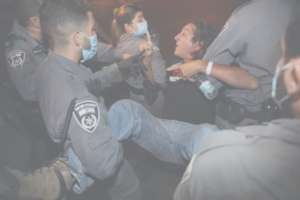Israel Police Organized Crime Unit Is Targeting anti-Netanyahu Protest Leaders

Police arresting one of the protest leaders in Jerusalem, October 17, 2020
The police have recently begun using a major crimes unit, which normally works against organized crime, to investigate leaders of the protest against Prime Minister Benjamin Netanyahu. The Association for Civil Rights in Israel has warned that the police may be creating a special database with personal information about protest leaders. The police deny the allegation.
The police say they have identified the “hardcore” leadership of the protest. A senior officer said there are about 20 people in this group, most of them Tel Aviv residents with no criminal record, but some are known to the police for what it calls disturbing the peace.
Members of the central unit of the Tel Aviv district police, which is usually responsible for investigating major crimes, have begun showing up regularly at protests. Protest participants have also reported that undercover police have been surveilling them elsewhere, even on days with no protests.
One activist said that as he was leaving his apartment building late at night about 10 days ago, almost a full 24 hours before a planned protest, he saw an undercover detective waiting for him. The activist began following the detective, but eventually lost him. “I waited for him by his car, he came back about half an hour later wearing different clothes, got into the car and sped off. The car was parked in front of our apartment building,” he said.
Undercover police are said to be sticking close to protest leaders during the demonstrations themselves. Shai Sadeh, a prominent protest leader, said he was arrested a week ago Saturday night, after he pointed out four undercover cops and warned the other marchers, and said they were “not the regular police, it’s the Tel Aviv central unit.”
A week earlier, Sadeh was arrested before the demonstration had even begun. According to Sadeh, when he came into the interrogation room he saw videos that had been shot by detectives who were following him. In one, he saw himself sitting with a friend an hour before the protest began. Sadeh said that when he was arrested, “the detective asked me why I hadn’t moved when the police patrol car was driving behind me. He showed me a video where I’m walking ahead of the patrol car. I asked him how he could know from this that I didn’t move. He said that’s what he read in the file. That’s why they arrested me.”
The police responded: “As part of the police preparations to deal with mass-participation events and in keeping with the operational assessment ahead of these events, the police use a variety of means and units to maintain the law, public order and security.”
“Misuse of data”
Activists say they have seen increased incidences of confiscation of protesters’ cellphones after their arrest. The police need a warrant to look at a citizen’s cellphone, but protesters believe that the police are misusing information from their phones.
Protesters said that during the period when demonstrations were restricted to one kilometer from people’s homes, the police, mainly in Jerusalem and Tel Aviv, asked protesters to identify themselves so they could issue tickets.
However, in some places protesters were asked for their personal information without reference to the coronavirus distance restrictions. For example, in a protest last week in the small community of Tzur Hadassah near Jerusalem, police officers began walking among protesters asking for their personal information. “We were all standing at a distance from each other, older people, quiet, with masks, but the officer simply went from one to another and asked them to identify themselves,” Amir Fink, a protester at the scene, said. “When I asked him why he was doing it, he said it was to check if there were people there with a criminal record. It’s ridiculous. When I asked him if they kept the list, he said yes.”
At a protest in Tel Aviv a week ago, a group of protesters on Frishman Street were told to show their ID cards to police officers, who then photographed them with their cellphones. The police did not say anything about issuing tickets to the protesters, making it unclear why their personal information had been documented.
“The police are not supposed to be infringing on the privacy of individuals who are not suspected of a crime, especially in the context of a protest. Holding personal information of protesters who are not suspected of crimes in the police database is illegal and seriously deters protesters from taking advantage of their legal right to protest,” ACRI wrote.
The police responded that “enforcement and checking protesters to ensure they are complying with regulations is required by the situation. Enforcement is not used to create a database of surveillance of any kind.”
